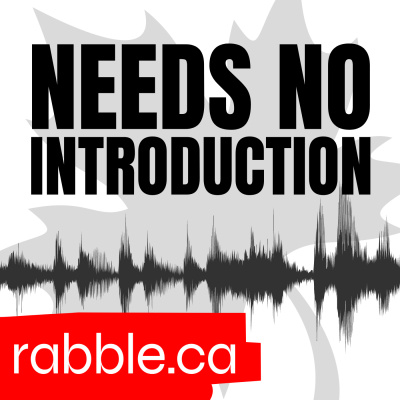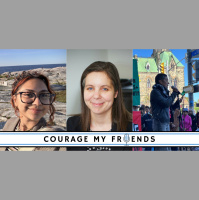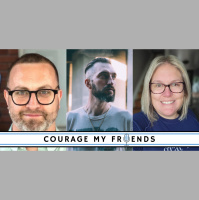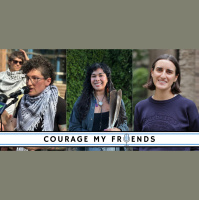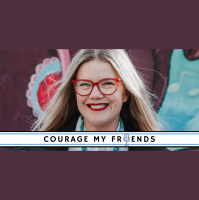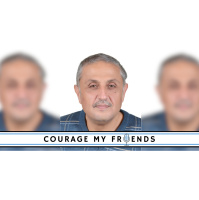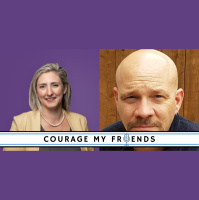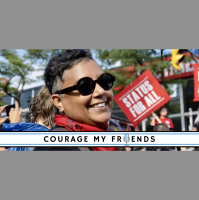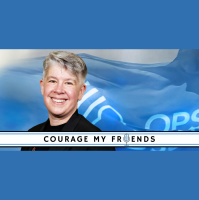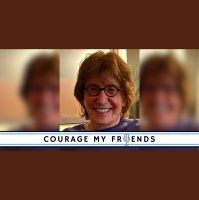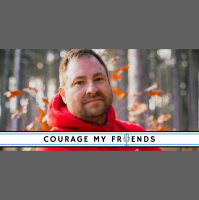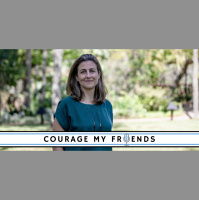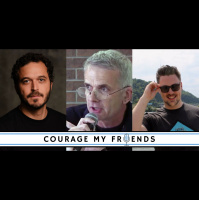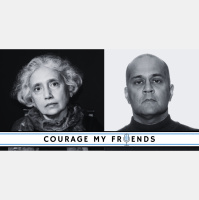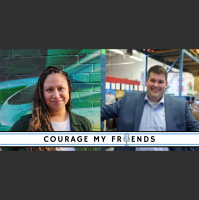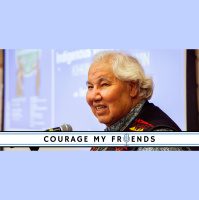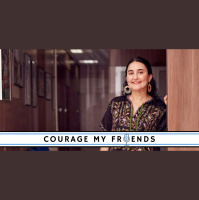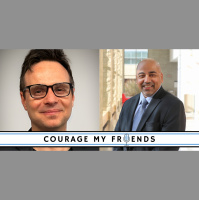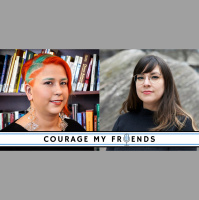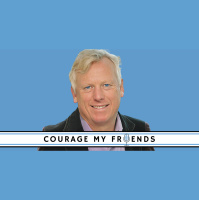Sinopsis
A series of speeches and lectures from the finest minds of our time. Fresh ideas from speakers of note.
Episodios
-
Bills C-2 and C-12: How Canada’s border security acts endanger refugee rights
15/10/2025 Duración: 01h06minIn episode four, we welcome co-executive director of the Migrant Workers Alliance for Change, Karen Cocq, advocacy and media relations coordinator at The Refugee Centre in Montreal, Alina Murad and President of the Canadian Association of Refugee Lawyers, Aisling Bondy. We discuss the Carney Government’s new border security acts, Bill C-2 and its questionable make-over with the recently tabled Bill C-12, how they effectively rewrite Canada’s approach to refugee rights and protections, whether this new security regime is a response to the Trump tariff demands or an opportunity to continue Canada’s years-long tightening of the borders, and if passed, what these acts could mean for those seeking asylum and for Canada as a whole. On Bill C-2, Cocq says: “We're calling it this mass deportation machine … government being able to use these new powers to remove many more people, that's what's really frightening to us … that it's going to look a little bit more like what's happening in the United States.” On the tabli
-
Crisis or scandal? The deliberate dismantling of Ontario's public college system
01/10/2025 Duración: 01h08minIn our third episode we welcome support staff president for the Ontario Public Service Employees Union Local 418 at St.Lawrence College. Amanda Shaw, second vice president of OPSEU Local 415 at Algonquin College, Martin Lee and from George Brown College, member of OPSEU's part-time and sessional divisional executive, Ben McCarthy. We discuss the mass layoffs and program and campus closures across Ontario's 24 publicly funded colleges, impacts on college workers, students, and wider communities, what this means for the future of public post-secondary education and how what has been publicized as a "crisis" is really a scandal of the deliberate dismantling of the public college system by the Government of Ontario. According to Lee: “We've been using the word 'crisis' a lot, right? And, you know, it's got all the symptoms of being a crisis ... But it's not a crisis, it's a scandal. What we're actually looking at is a scandal. A crisis is something that happens. A rainfall, you know, it's an act of God. No, no, t
-
On September 20: Draw the line for people, for peace, for planet
15/09/2025 Duración: 56minIn this episode we welcome, climate justice and Indigenous rights organizer from Stellat’en First Nation and senior advisor at the David Suzuki Foundation, Janelle Lapointe; member services and movement building manager with Climate Action Network Canada, Lauren Latour and Canada organizer for World Beyond War, Rachel Small. We discuss the Draw the Line National Day of Action taking place across Canada on September 20, the reasons for this historic cross-movement coalition and the urgency of drawing the line now in this moment of converging and overwhelming crises, for people, for peace and for the planet. Speaking to origins of Draw the Line, Latour says: “After years and years and years of communities from across progressive spaces saying, we need to learn how to work together in community. We need to learn how to build coalition. It just felt like this was the perfect opportunity for that.” On the critical need for a coalition, Lapointe says: “We're all waking up to the root cause of the crises, which is i
-
Lawless: The complete decriminalization of abortion… only in Canada
03/09/2025 Duración: 01h01minIn our season nine premiere, we welcome Martha Paynter, nurse, scholar and author of Lawless: Abortion Under Complete Decriminalization. We discuss Canada’s complete decriminalization of abortion (the only country to do so), the fascinating and often fraught history that brought us to this point, abortion as a public good, the influence of the anti-choice lobby here and the overturning of Roe vs. Wade in the US, and what it takes to make abortion truly equitable when decriminalization is not enough. Reflecting on the need to understand abortion as a public good, Paynter says: “We have these major cultural forces that just reiterate this idea that abortion is rare and hard. And it's not, it's very normal. It's very common and it takes seven minutes. And actually it will allow you to follow your dreams. Whether that dream is to escape a violent relationship or to finish your graduate degree or whatever. So we do need to have this shift in the way we talk about abortion. And we need to understand abortion, not
-
Palestine and the weaponizing of hunger and the climate crisis
14/05/2025 Duración: 01h02minIn episode nine of the Courage My Friends series, we welcome visiting professor and dean of the faculty of agriculture and veterinary medicine at Gaza’s Al-Azhar University, Dr. Ahmed Abu Shaban. We discuss the weaponization of already fragile food systems in Gaza, the acceleration of the climate crisis through conflict and Palestinian resilience under occupation. Reflecting on the nexus of food, climate and occupation, Abu Shaban shares: “My father passed away in 2021 and we had a farm in Gaza. This farm was destroyed several times. And this farm is an olive trees farm. And olives, you know, you need to wait at least three to five years to get production out of it.So several times we cultivate the seedlings … The Israelis come inside … and destroy the land, cut the trees. My father would just … recultivate the trees again. I told him, Listen, but this is really too expensive because we are investing a lot of money in this and we never see the production of them. And my father said, Let them cut it for 100
-
Labour Fair 2025: Labour now: Union responses to the polycrisis
16/04/2025 Duración: 54minIn episode eight, we return to the George Brown College Labour Fair and a discussion with Ontario Federation of Labour president Laura Walton and chief steward and second vice president of OPSEU/SEFPO Local 556 Jeff Brown. We discuss the multiple issues facing the labour movement, union priorities and, in this age of polycrisis, what exactly we are working for. Speaking to the upcoming federal elections, Walton says: “I think we all can agree it's not going to be an NDP federal government. It's either gonna be Liberals or Conservatives. And I call them cancer and chemo; one's gonna kill you, the other one's gonna make you sick. We're going to be under, in Ontario, two governments that are not worker friendly, both federally and provincially. And it's going to be incumbent on workers to really embrace organizing principles … Now's not the time to be quiet. Now's the time that we're going to have to join our voices together to really push back." Reflecting on the how the trade war may impact already underfunded
-
Labour Fair 2025: Building a workers' first emergency response to the tariff crisis
11/04/2025 Duración: 01h07minIn episode seven, we are pleased to feature executive director of the Workers’ Action Centre, Deena Ladd. In her keynote address for the 33rd annual Labour Fair at Toronto’s George Brown College, No One Left Behind: Building a Workers’ First Emergency Response to the Tariff Crisis that Unites Us, Ladd discusses the current trade war, the dangers facing workers and a solidarity-driven plan that puts workers first. Reflecting on what’s needed in a workers’ first approach to the tariff crisis, Ladd says: “Our communities are already in trouble. And we know that the tariffs imposed are gonna have a ripple impact, far worse than the pandemic's… We desperately need a government strategy that has learned from these past economic crises to ensure that no one gets left behind. ..To make sure that when you are providing supports, that they first of all have to be adequate. That they're not institutionalizing poverty. That they're accessible … And that they're structured in a way that doesn't unintentionally punish peop
-
Labour Fair 2025: The critical need for labour education
02/04/2025 Duración: 54minIn episode six, we feature the opening discussion of the 33rd annual Labour Fair at Toronto’s George Brown College. Under this year's theme, What Are We Working For? JP Hornick, president of OPSEU/SEFPO, (Ontario Public Service Employees Union), speaks on the critical need for labour education, labour organizing amid the changing nature of work and the crisis facing Ontario colleges. Reflecting on the need for labour education Hornick says: “These are the spaces where we learn how to organize, where we learn how to build community – it provides the critical analysis that people need to understand why there are inequities in society. Why systems of oppression such as racism, ableism, sexism, ageism, homophobia and transphobia are being used right now in this moment to try and divide workers from one another. Programs like the School of Labour or labour education are where we actually start to have conversations with workers about why we're not one another's enemies. I think about this quote from Angela Davis:
-
Rebranded fascism, higher education and the burden of conscience
12/03/2025 Duración: 59minIn episode five, we are pleased to welcome back Henry Giroux, scholar, cultural critic and author, most recently of The Burden of Conscience: Educating Beyond the Veil of Silence. We discuss the rise of authoritarianism in the US and around the world as an updated fascism, its attack on democracy and higher education and the urgent need for solidarity, critical pedagogy and resistance in the face of the unspeakable. Reflecting on the necessity of higher and critical education in these times, Giroux says: “Education is the glue. Education is the bridge that stands between fascism and hope, between fascism and justice, between fascism and a socialist democracy, a real democracy, a radical democracy. And if we don't grasp the centrality of education here in terms of both its power and its role, both in and outside of schooling, we're in trouble. It's not going to work.” About today’s guest: Henry A. Giroux currently holds the McMaster University Chair for Scholarship in the Public Interest in the English and C
-
George Brown College’s 25th annual Mental Health Conference: Decolonizing learning and creating conditions for student well-being
19/02/2025 Duración: 39minIn episode 4, we focus on the upcoming 25th annual Mental Health Conference at George Brown College in Toronto and this year’s theme, Thriving Together in the Classroom: Creating the Conditions for Student Well-Being. Author, storyteller, Indigenous academic and conference keynote speaker Carolyn Roberts; dean of the Centre for Preparatory and Liberal Studies, Susan Toews; and director of Student Well-Being and Support, Alex Irwin discuss this year’s conference and its focus on teaching, the mental health and well-being of post-secondary students, decolonizing learning and Indigenous resurgence through education. Reflecting on the need for decolonizing and re-storying education, Roberts says: “When Indigenous students step into the classroom, we are being asked to leave a part of who we are at the door, because that's not talked about or shared within those spaces. So we have to leave our indigeneity at the door to come in to learn about something else. And that's not a sustainable thing.And not only for Ind
-
Oxfam Inequality Report 2025: Billionaire colonialism in Canada
13/02/2025 Duración: 40minIn part two of our focus on Oxfam’s latest report: Takers Not Makers: The Unjust Poverty and Unearned Wealth of Colonialism, we welcome associate professor and faculty chair of the Indigenous Relations Initiative at McGill University, Dr. Veldon Coburn. Reflecting on his 2022 book (co-edited with David Thomas) Capitalism and Dispossession: Corporate Canada at Home and Abroad, we speak of the growth of billionaire colonialism and corporate power in Canada and the ways in which this is anchored in Canada’s continuing history of settler colonialism. Reflecting on corporate extraction and dispossession of Indigenous resources, Coburn says: “It's easier to steal and to take what's existing there, exactly what the Oxfam Report is titled, Takers Not Makers is the failure of the promise of capital to reproduce itself. .. wealth is only created through ongoing theft and dispossession… taking from someone else. And the broligarchs, the billionaire oligarchy, have seized quite a few of the interests of the State. And i
-
Oxfam Inequality Report 2025: The takers not makers of billionaire colonialism
05/02/2025 Duración: 43minIn part one of this discussion, executive director of Oxfam Canada Lauren Ravon returns to discuss Oxfam’s latest report: Takers Not Makers: The Unjust Poverty and Unearned Wealth of Colonialism. Ravon and Resh Budhu explore the extreme wealth and power of the billionaire class, this era of “billionaire colonialism” and what it will take to decolonize economies in Canada and throughout the world. According to Ravon: “I would say the highlight of this year's report is really well captured by the title Takers Not Makers, because we're focusing not just on this extreme and I'd say obscene wealth accumulation, not just the amount of wealth that's being held by the very few, but the fact that this is not wealth that is earned in any sense. This is wealth that has been taken, whether through corruption, through cronyism, through monopolistic power, through connections through inheritance, but also through the legacy, the very life legacy of colonialism." About today’s guests: Lauren Ravon, executive director of
-
Do we need a new progressive alternative in Canada?
22/01/2025 Duración: 58minIn our season eight premiere, we welcome independent journalist and public historian Taylor C. Noakes, author, political economist and senior researcher with the Canadian Centre for Policy Alternatives Ricardo Tranjan and welcome back writer, social justice activist and former organizer for the Ontario Coalition Against Poverty, John Clarke. The group reflects on the current state of progressive politics in Canada, the Liberal legacy and the possibility of a Conservative win. They discuss the need for a new progressive alternative and wonder aloud what this could look like. Reflecting on Canadian political parties, Noakes says: “They are far too established. They have become organizations unto themselves that seek self-preservation above all else … It has essentially prevented them by and large from experiencing the kind of renewal that's necessary to keep political parties vibrant and connected to people in their day-to-day concerns.” Speaking to the rise of political right-wing populism, Clarke says: “Peopl
-
BRICS, de-dollarization and Canada in a multipolar world
10/12/2024 Duración: 01h09minIn our final episode of the Courage My Friends podcast series, season seven, we are joined by author, professor and director of the Geopolitical Economy Research Group at the University of Manitoba, Dr. Radhika Desai, and author, professor and Chair of International Relations and Political Science at St. Thomas University, Dr. Shaun Narine. We discuss the shifting balance of power in global politics, BRICS, de-dollarization, the rise of Asia and the Global South, the challenges it poses to the rules-based international order of the Global North and Canada’s place within an inevitably multipolar world. Speaking on the growth of multipolarity, Desai says: “Lenin argued that imperialism, by which he meant the stage capitalism had arrived at in the early 20th century, was the highest stage of capitalism … Beyond it, there was not much capitalism had to give to humanity… After 40 years of neoliberalism … it is quite obvious that it is suffering from senility … low growth rates, low investment rates, low innovation
-
Who’s Hungry? More than ever before
26/11/2024 Duración: 56minIn episode six of the latest season of the Courage My Friends podcast series, co-executive director of Food Secure Canada, Marissa Alexander and executive director of North York Harvest Food Bank, Ryan Noble discuss the alarming outcomes of Toronto’s Who’s Hungry report, the growing food and poverty crisis in Toronto and across Canada and urgent actions that need to be taken by policy-makers and civil society in averting this ever-worsening crisis. Reflecting on reasons for the record number of food banks visits this year, Noble says: “It's not as if there's been a sudden shock over the last year. What we're seeing is the continued culmination of insufficient supports for people, public and private, to deal with skyrocketing costs of living. .. whether those are employment supports, social assistance supports, settlement supports, to deal with an out of control cost of living, primarily driven by housing, but also by the cost of food and other essentials.” According to Alexander: “I don't think the systems ar
-
The Honourable Murray Sinclair: 2018 keynote address on Indigenous Ways of Knowing
12/11/2024 Duración: 52minIn 2018, the Tommy Douglas Institute at George Brown College in Toronto welcomed then Senator and former head of the Truth and Reconciliation of Canada, the Honourable Murray Sinclair as its keynote speaker. Through his poignant address about the impacts of Canada’s colonial history and the residential school system on the lives of Indigenous Peoples and the meaning of reconciliation, we experienced first-hand the brilliance, integrity, kindness and humour of this truly remarkable individual. The Honourable Murray Sinclair passed away on the morning of November 4, 2024. In his memory, we bring you his 2018 keynote address on Community, Education, Change: Indigenous Ways of Knowing. Reflecting on reconciliation, Sinclair said: “Reconciliation is a process which is building. It's not a spectator sport. It involves everybody. And everybody is implicated in it .. No neutrality exists here. .. And understanding it is part of the educational process. And understanding the implications it has for you is part of the
-
Palestinian storytelling as resilience, recuperation and resistance
29/10/2024 Duración: 01h14minIn episode four, Palestinian storyteller Sarah Abu-Sharar joins us for our third annual Mouth Open Story Jump Out episode. Through Palestinian folktales and stories of her father, she reflects on the meaning and power of stories within Palestinian resilience, recuperation and resistance. Reflection on her journey into storytelling, Abu-Sharar says: “When I started storytelling, it had to be for Palestine because it was reclaiming my identity. It was a way of saying, the Occupation might have deprived me of my land, of my culture, but I will resist by telling our stories.” About today’s guest: Sarah Abu-Sharar comes from a long line of storytellers on her paternal side. She tells stories to both adults and children. Abu-Sharar has told stories both nationally and internationally at festivals in Canada, Italy, Croatia, Bosnia, Tunisia, Morocco and the United Arab Emirates. Because Abu-Sharar grew up in several countries she tells stories from all over the world with the focus on Palestinian and Croatian storie
-
EdTech, AI and platform capitalism in the classroom
08/10/2024 Duración: 01h20minIn episode three, researcher Dr. Rahul Kumar and political economist Dr. Tanner Mirrlees discuss the rise of education technology and artificial intelligence across colleges and universities, how they impact and disrupt teaching and learning, and how public post secondary education has become an incredibly lucrative business for privately owned EdTech corporations. Reflecting on the impacts of EdTech companies on education, Mirrlees says: “The very same business model that these corporations have developed and advanced in all facets of social life are now being advanced throughout the context of public education. Whereby platform capitalism is becoming the classroom. Surveillance capitalism is becoming the classroom. Data is being aggregated about all of the users of these services, teachers, learners, administrators, everyone.” Describing the interminable cycle of EdTech and AI, Kumar says: “Imagine a triangle where we have pedagogy, privacy and privatization. … pedagogy, we need to teach these things. Oh m
-
Truth and reconciliation: How is Canada doing?
24/09/2024 Duración: 54minEpisode two welcomes research director of the Yellowhead Institute at Toronto Metropolitan University, Eva Jewell and director of education, outreach and public programming at the National Centre for Truth and Reconciliation, Kaila Johnston. As we enter National Truth and Reconciliation Week, we discuss Canada’s progress on the Truth and Reconciliation Commission’s 94 Calls to Action and the meaning of reconciliation and reclamation in this settler-colonial state. Reflecting on Canada’s progress on reconciliation, Johnston says: “It's been the low hanging fruit or the easy Calls to Action that have been addressed to date … A lot of the work that I have seen is through grassroots organizations and others who've been working away at the Calls to Action.” Speaking about two key aspects of reconciliation, Jewell says: “The first is for Canadians. They have to reconcile with themselves and with what their country has done … And then there's the work that we have to do as Indigenous Peoples … and that is reclaiming
-
Climate and the city: Are we ready?
10/09/2024 Duración: 44minIn our season seven premiere, we welcome the managing director of the C40 Centre for City Climate Policy and Economy and former mayor of Toronto, David MIller. We discuss the crucial role of cities in “fixing” the climate crisis, what we can learn in building sustainable and equitable urban communities and explore the question of just how prepared Canadian cities are to meet the challenges of this crisis. Reflecting on the key role of cities in dealing with the climate crisis, Miller says: “The international community said, okay, climate change is a problem. And then they took 21 years to come to an agreement. Twenty-one years! … A mayor would be thrown out if she waited 21 years to act on anything. It's just inconceivable. So the nature of city governments lends themselves to action. And because they have responsibilities that significantly impact on whether we're going to have low-impact cities from a planetary perspective, whether we're going to have cities that emphasize equality or produce inequality. Th
